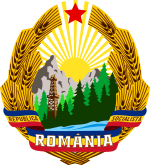Scînteia
Media of Romania |
| Part of a series on the |
| Socialist Republic of Romania |
|---|
 |
Scînteia (
Communist groups at different intervals in Romanian history. The title is a homage to the Russian language paper Iskra. It was known as Scânteia until the 1953 spelling reform
, which replaced the letter  with the phonologically identical Πin all cases.
History
1919 in Odessa
The first paper of that name was edited by Romanian revolutionaries in
Odessa
.
In Romania (1931–1989)

Scânteia reemerged as the official voice of the
Communist Party of Romania on August 15, 1931, being published clandestinely in Bucharest until 1940, when the hostility between Romania and the Soviet Union grew to a level where a crackdown on communist propaganda
became imminent.
In the wake of
slander campaigns against intellectuals such as Tudor Arghezi
). Moreover, in 1961, August 15, the date on which the newspaper had first been published in Romania 30 years previously, was declared the Romanian Press Day — indicative of the relationship between the official voice and other media.
The headquarters of the paper were the main feature of the
Socialist Realist Combinatul Poligrafic Casa Scînteii "I.V. Stalin", a name later reduced to Casa Scînteii, after it dropped the reference to Joseph Stalin during De-Stalinization. Today, the building goes by the name of the House of the Free Press
(Casa Presei Libere).
Scînteia was accompanied by a youth version, one edited by the Union of Communist Youth (a branch of the Party that resembled the Soviet Komsomol, up to a point). Scînteia Tineretului (or Scânteia tineretului; approximately "Youth's Spark") began its edition in November 1944. It was also published under the names of Tinerețea ("The Youth") and Tînărul Muncitor (or Tânărul Muncitor; "The Young Worker").
Fate after December 1989
With the 1989
overthrow of the Communist regime came the outlawing of all Communist Party institutions, including all its newspapers, Scînteia's assets were mostly taken over by the post-communist Adevărul
.
Post-1944 editors in chief
Casa Scînteii
, 1977- Miron Constantinescu (1944–1947)
- Sorin Toma (1947–1960)
- Theodor Marinescu (1960–1965)
- Dumitru Popescu (1965–1968)
- Alexandru Ionescu (1968–1978)
- Constantin Mitea (1978–1981)
- Ion Cumpănașu (1981–1984)
- Ion Mitran (1985–1989)
Other staff
See also
- Eastern Bloc information dissemination
References
- (in Romanian) "Scânteia, ziarul cu două fețe" ("Scânteia, the Two-Faced Journal"), in Evenimentul Zilei, 14 January 2006
